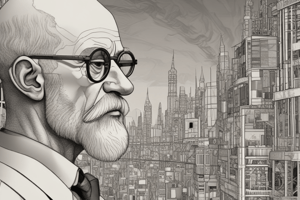Podcast
Questions and Answers
What does Durkheim advocate for in observing social facts?
What does Durkheim advocate for in observing social facts?
- A focus only on quantitative data
- Prioritizing theorization over empiricism
- The suspension of biases and preconceptions (correct)
- Applying personal beliefs during observations
What does Durkheim's causal logic framework represent?
What does Durkheim's causal logic framework represent?
- The interplay between theory and practice
- The distinction between correlation and causation (correct)
- The importance of qualitative research over quantitative
- The relationship between two unrelated variables
Which social factors did Durkheim believe significantly affect individual behavior in his study of suicide?
Which social factors did Durkheim believe significantly affect individual behavior in his study of suicide?
- Cultural beliefs and practices
- Mental health and personal struggles
- Economic status and education level
- Social integration and order (correct)
What are the two types of solidarity defined by Durkheim?
What are the two types of solidarity defined by Durkheim?
What type of community is characterized by strong personal bonds according to Durkheim?
What type of community is characterized by strong personal bonds according to Durkheim?
How does functionalism view society?
How does functionalism view society?
What is a criticism of functionalism noted in the content?
What is a criticism of functionalism noted in the content?
What does the concept of manifest functions refer to in functionalism?
What does the concept of manifest functions refer to in functionalism?
What does the term 'generalized other' refer to?
What does the term 'generalized other' refer to?
What is the first stage in Mead's development of self?
What is the first stage in Mead's development of self?
In Goffman's Dramaturgical Approach, which term best describes public performances shaped by societal norms?
In Goffman's Dramaturgical Approach, which term best describes public performances shaped by societal norms?
Which of the following is one of the fundamental premises of symbolic interactionism established by Herbert Blumer?
Which of the following is one of the fundamental premises of symbolic interactionism established by Herbert Blumer?
What does impression management involve according to Goffman?
What does impression management involve according to Goffman?
Which of the following sociological perspectives focuses on small-scale social interactions?
Which of the following sociological perspectives focuses on small-scale social interactions?
In the context of symbolic interactionism, how are meanings created?
In the context of symbolic interactionism, how are meanings created?
Which sociological approach views society as a stable system where parts work together for equilibrium?
Which sociological approach views society as a stable system where parts work together for equilibrium?
What term describes the social structures governing production, including ownership and labor organization?
What term describes the social structures governing production, including ownership and labor organization?
Which of the following correctly outlines the historical progression of societal stages according to Marx?
Which of the following correctly outlines the historical progression of societal stages according to Marx?
What does conflict theory emphasize as maintaining social order?
What does conflict theory emphasize as maintaining social order?
How does Marx view the relationship between the ruling class and the intellectual forces of society?
How does Marx view the relationship between the ruling class and the intellectual forces of society?
What was Marx's view on how societal change occurs?
What was Marx's view on how societal change occurs?
How does conflict theory interpret social institutions such as government and education?
How does conflict theory interpret social institutions such as government and education?
What is the main focus of symbolic interactionism?
What is the main focus of symbolic interactionism?
What is a key criticism of functionalism?
What is a key criticism of functionalism?
Which statement best describes a contrast between conflict theory and functionalism?
Which statement best describes a contrast between conflict theory and functionalism?
What does Charles Cooley's 'Looking-Glass Self' suggest about the formation of self-identity?
What does Charles Cooley's 'Looking-Glass Self' suggest about the formation of self-identity?
What aspect of Marx's ideas remains relevant today despite some incorrect predictions?
What aspect of Marx's ideas remains relevant today despite some incorrect predictions?
According to Marx, what continues to generate inequality in society?
According to Marx, what continues to generate inequality in society?
What distinguishes the 'I' from the 'Me' in George Herbert Mead's theory?
What distinguishes the 'I' from the 'Me' in George Herbert Mead's theory?
What are the four stages of cognitive development according to Jean Piaget?
What are the four stages of cognitive development according to Jean Piaget?
Which aspect of self does Freud emphasize as being particularly influential in personality development?
Which aspect of self does Freud emphasize as being particularly influential in personality development?
What continues to be relevant about Marx’s theories despite some incorrect predictions?
What continues to be relevant about Marx’s theories despite some incorrect predictions?
What does anti-essentialism emphasize in relation to identity?
What does anti-essentialism emphasize in relation to identity?
What is color-blind racism criticized for ignoring?
What is color-blind racism criticized for ignoring?
What does intersectionality help to analyze?
What does intersectionality help to analyze?
What does Linda Tuhiwai Smith argue about Western knowledge?
What does Linda Tuhiwai Smith argue about Western knowledge?
How does Smith describe the term 'cultural archive'?
How does Smith describe the term 'cultural archive'?
What aspect of Western discourse does Smith critique regarding race and gender?
What aspect of Western discourse does Smith critique regarding race and gender?
What is a major limitation of the social scientific approach as discussed by Smith?
What is a major limitation of the social scientific approach as discussed by Smith?
What does Smith argue is the consequence of Western classification systems?
What does Smith argue is the consequence of Western classification systems?
Flashcards are hidden until you start studying
Study Notes
Durkheim and Functionalism
- Empiricism over Theory: Durkheim advocated for observing social facts through direct observation and data collection, minimizing pre-conceived notions.
- Causality: He distinguished between correlation and causation, emphasizing the need to understand causal mechanisms in social science.
- Suicide Study: His research on suicide highlighted how social factors, such as integration and social order, influence individual behavior.
- Social Cohesion and Division of Labor: Durkheim argued that the division of labor strengthens social solidarity. He differentiated between mechanical solidarity (sameness, minimal division of labor) and organic solidarity (complex division of labor, interdependence).
- Community Types: He identified two types of communities: Gemeinschaft (close-knit, strong personal bonds) and Gesellschaft (larger, impersonal, less committed).
- Functionalism: This perspective views society as a system of interconnected parts, each contributing to overall stability. It includes manifest functions (intended consequences) and latent functions (unintended consequences).
- Criticisms of Functionalism: Objections include supporting the status quo and overlooking societal inequalities.
Marx and Conflict Theory
- Class Struggle: Marx believed history is driven by class conflict, particularly between the bourgeoisie (capitalist class) and the proletariat (working class).
- Power and Ideology: The ruling class controls material resources and intellectual forces, shaping dominant ideas to maintain power.
- Social Change: Marx proposed that societal change happens through revolutions initiated by struggles between opposing classes.
- Conflict Theory Overview: This perspective sees society as composed of groups with unequal power, leading to exploitation and inequality. Social order is maintained through domination and power, not consensus.
- Conflict Theory vs. Functionalism: Functionalism emphasizes balance and interdependence of social institutions, while conflict theory focuses on power struggles, inequality, and inevitable social change driven by conflict.
- Criticisms of Conflict Theory: It is criticized for neglecting social cohesion and cooperation.
- Relevance of Marx's Ideas: While some of his predictions were inaccurate, his theories on inequality, agency, and resistance remain relevant. His analysis of capitalism's inherent inequality and the role of ideology in maintaining social structures continues to be influential.
Symbolic Interactionism
- Focus: This sociological perspective examines micro-level social interactions and their impact on society and individual identities.
- Shared Meanings: Symbolic interactionism explores how shared meanings, created through interactions, shape human behavior and social structures.
- The Self: A distinct identity that sets individuals apart and develops through social interaction.
- Sigmund Freud: Saw the self as a product of social interaction, particularly with parents.
- Jean Piaget: Developed a cognitive theory of development with four stages: sensorimotor, preoperational, concrete operational, and formal operational. Social interaction is essential for cognitive development.
- Charles Cooley's "Looking-Glass Self:" The self emerges through three phases: imagining how others see us, imagining how others evaluate us, and developing self-identity based on these perceptions.
- George Herbert Mead: Distinguished between the "I" (acting self) and the "Me" (socialized self). The "generalized other" represents society's expectations and norms.
- Stages of Self-Development: Preparatory (imitation), play (pretending to be others), and game (understanding roles within broader social context).
- Erving Goffman's Dramaturgical Approach: Individuals are like actors performing roles based on social expectations.
- Front Stage and Back Stage: Public performances shaped by societal norms vs. private moments revealing true selves.
- Impression Management: Individuals adjust their behavior to create favorable impressions.
- Social Scripts and Face Work: Navigating social scripts while engaging in face work to avoid embarrassment and maintain social order.
- Symbolic Interactionism's Key Premises (Blumer): Humans act based on meanings ascribed to things, meanings are created through interaction, and individuals modify meanings through interpretation.
- Symbolic Interactionism vs. Other Perspectives: Compared to Macrosociology (focus on large-scale phenomena), Symbolic Interactionism operates at the micro level, examining everyday interactions, while Functionalism views society as a stable system, and Conflict Theory focuses on power imbalances.
Intersectionality (Crenshaw)
- Key Concepts: Anti-essentialism (against simplifying identities) and the rejection of color-blind racism (recognizing race's continued influence on inequalities).
- Central Argument: Intersectionality emphasizes the interconnectedness of different forms of oppression, offering a comprehensive framework for understanding social justice issues.
Studying That Suits You
Use AI to generate personalized quizzes and flashcards to suit your learning preferences.




